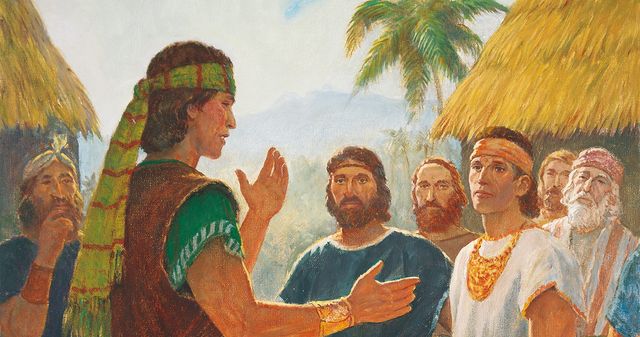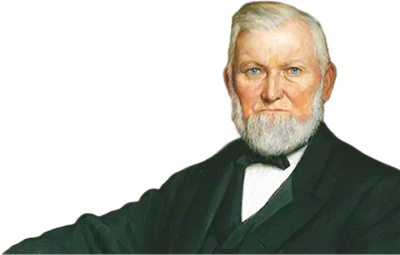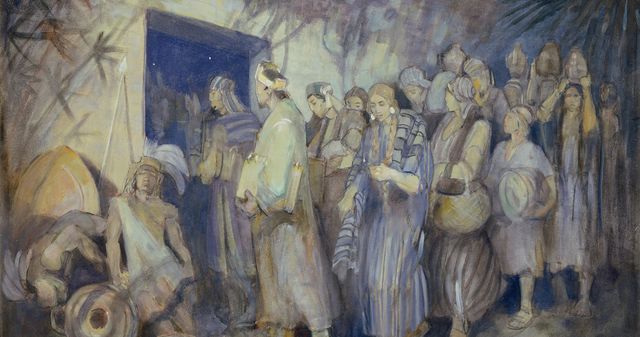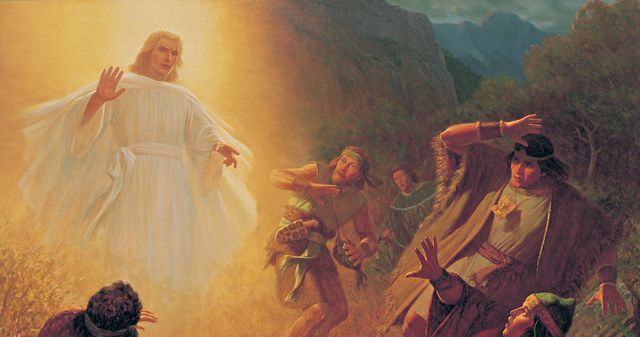
Covenants have everything to do with family, both creating our families here on earth and receiving assurance of their continuity in eternity. But the process of making and keeping those covenants can be accompanied with loneliness and loss, as both Phebe Woodruff and Ruth can attest.
Ruth’s dedication to her new faith and family motivated her to follows her mother-in-law Naomi to the land of Judah. Ruth and her husband Mahlon, an Israelite, lived in Moab for ten years before Mahlon’s death. Naomi, whose husband and other son had also died in Moab, determined she had no choice but to return to Judah where her family came from. While Naomi did not require Ruth to accompany her, Ruth showed her commitment to Naomi and the God of Israel by leaving her homeland of Moab and moving to Bethlehem with Naomi.
When Naomi tested Ruth’s resolve by suggesting she return to her own family and her former religion, Ruth said, “Entreat me not to leave thee, or to return from following after thee: for whither thou goest, I will go; and where thou lodgest, I will lodge: thy people shall be my people, and thy God my God: Where thou diest, will I die, and there will I be buried: the Lord do so to me, and more also, if ought but death part thee and me.” (Ruth 1:16-17)
Conversion and Resolve
Before her conversion to the gospel of Jesus Christ, Phebe Whittemore Carter was living with her family in Scarboro, Maine, where she was born in March 1807. Phebe was baptized a member of The Church of Jesus Christ of Latter-day Saints in Maine in 1834, and like Ruth, chose to leave her family to follow her new faith.

Phebe Whittemore Carter Woodruff, Boston, 1849 [1]
According to Phebe’s autobiography, leaving her family and her home was heart-wrenching for her:
My friends marveled at my course, as did I, but something within impelled me on. My mother’s grief at my leaving home was almost more than I could bear; and had it not been for the spirit within I should have faltered at the last. My mother told me she would rather see me buried than going thus alone out into the heartless world. . . . When the time came for my departure I dared not trust myself to say farewell; so I wrote my good-byes to each, and leaving them on my table, ran downstairs and jumped into the carriage. Thus I left the beloved home of my childhood to link my life with the saints of God.[2]
About a year after arriving in Kirtland, Phebe met and married young Wilford Woodruff, who had recently returned from his first mission to the southern United States. The new bride and recent convert led a sometimes lonely and often difficult life of dedication to her oft-traveling husband and her new faith far from her first home in Maine, just as Ruth faced with Naomi.
Covenant women, such as Ruth and Phebe, often face incredible loneliness and their lives are not sheltered from the pain of loss. Kerry Muhlestein, in his BYU publication “Ruth, Redemption, Covenant, and Christ,” describes what Ruth faced by following Naomi: “Naomi is very aware that the women who were accompanying her, who were her family by covenant, were volunteering to undergo extreme hardship for the rest of their lives.”[3] Phebe, like Ruth, undertook these sacrifices willingly and with trust in God.
Faithful Missionary Service
When Phebe accompanied Wilford on his mission to the Fox Islands off the coast of Maine in 1837, Phebe was able to visit her parents and settle some of the rift that arose between them when she left home to join the Saints, Yet this visit was short-lived and Phebe was again far from her family when she settled in Montrose, Iowa, in 1838, and later moved to Nauvoo, Illinois. As Wilford was a committed missionary for the Church, serving away from home four of their first six years of their marriage, Phebe felt his loss keenly. While he was serving in England, she wrote him from Montrose on 8 March 1840:
Ah! what great changes may take place in one year and even in much less time— then my Willford was with me—but where is he now—far far from me acrost the mighty deep but I desire to be contented and reconciled to the will of God in all things, praying him to protect you from all evil and return you home once more to the bosom of your family who are anxiously waiting your return. . . . when I think how much I am alone in regard to relatives here.[4]
The couple served a mission together in England from 1845 to 1846, taking Phebe farther from home and two of their children, who were left in the care of family and friends. Then, after the heart wrenching loss of their two youngest sons in Winter Quarters in 1846, their nine-month-old daughter died in 1848 on their journey to serve another mission together in the Eastern States. They finally settled with the Saints in Salt Lake City in 1850.
Under God’s Wings
Wilford described Phebe’s strength and faith in the midst of one of these trials:
I soon found that the same spirit which had inspired her to imbrace the fullness of the gospel & forsake her friends & go a journey of 1000 miles to enjoy the society of the saints & had united her heart & hand with my own & caused her to accompany me to the Islands of the sea, was with HER STILL. Yes PHEBE possesses too much firmness, & faith in God & confidence in God to put her hand to the plough & look back or to wholey give way to such trials & any other however great. She is determined, like Ruth, to forsake her kindred & country for Christ’s sake & my own & the cause in which she is ingaged, & as I behold this principle beaming in her daily walk, heart & countenance it binds my whole soul to her in love stronger than death . . . yes that love that none partakes of except those in like circumstances, and that man that will not love his wife with all his heart after she has made such a sacrifice for his sake is not worthy of a companion or a standing in human society.[5]
Phebe’s faith journey as witnessed by her husband is mirrored in Ruth’s story recorded in the Old Testament. Ruth 2 reveals the depth of Ruth’s faithfulness through the observations of her new husband Boaz. “It hath fully been shewed me, all that thou hast done unto thy mother in law since the death of thine husband: and how thou hast left thy father and thy mother, and the land of thy nativity, and art come unto a people which thou knewest not heretofore. The Lord recompense thy work, and a full reward be given thee of the Lord God of Israel, under whose wings thou art come to trust.” (Ruth 2:11-12)
Testimony and Blessings
Phebe had also come to trust her place under the Lord’s wings. While we only get a few short chapters of Ruth’s story, Phebe’s faith is well documented through her own letters and her husband’s extensive record keeping. Phebe writes in her autobiography, “Of Joseph, my testimony is that he was one of the greatest prophets the Lord ever called; that he lived for the redemption of mankind, and died a martyr for the truth. The love of the Saints for him will never die.”[6] And Phebe knew what she was talking about, having spent much time in the company of the prophet Joseph and the home of Joseph and Emma Smith.

Excerpt of Phebe W. Carter Woodruff’s Patriarchal Blessing [7]
Phebe also knew the prophet’s father, having received her patriarchal blessing from Joseph Smith, Sr. in 1836. Wilford recorded Phebe’s blessing, which told her, in part,
No blessings in heaven shall be too great for thee. . . . Thou hast suffered in former days by being deprived of friends unto whom thou couldst unbosom thy mind; thou hast sorrowed in the night season and in solitary places, no one knew thy sorrow or saw thy tears but God thy Father be comforted, for thy troubles are over and God will pour out his blessings to thee. Thou shalt have long life and see good days. Thou shalt be the Mother of many children they shall be an ornament to the Church of Christ. . . . Let thy heart be comforted and have faith in God and his word rather than complain, thou must put thy whole trust in God.[8]
And trust in God she did. As mentioned previously, Phebe accompanied Wilford on his second mission abroad. When she was preparing to accompany him to England in 1844, she received a blessing at the hands of Heber C. Kimball and Brigham Young which, of course, her husband recorded. She was promised, in part, “your life & health shall be precious in the eyes of the Lord and in the hour of distress & trouble thou shalt be preserved by the power of God, thou shall be satisfied with your mission this life shall be prolonged & thou shalt be a comfort to thy husband.”[9]
Extraordinary Service
It was powerful moments like these that strengthened Phebe’s faith and made her equal to the tasks ahead of her, as was her dedication to her husband. “Of my husband I can truly say, I have found him a worthy man, with scarcely his equal on earth. He has built up a branch wherever he has labored. He has been faithful to God and his family every day of his life. My respect for him has increased with our years, and my desire for an eternal union with him will be the last wish of my mortal life.”[10] Their letters to each other through the years were affectionate and detailed. It was, in fact, Phebe who wrote to Wilford and told him of the prophet Joseph’s sermon in Nauvoo in which he revealed the principle of baptism for the dead, a message which the couple received with faith and excitement for the opportunity to serve their deceased extended family.
Again speaking of Ruth, Kerry Muhlstein writes, “Ruth shows that she is willing to go beyond what is expected of her; she will be extraordinary in her service.”[11] Phebe was also extraordinary in her service. During her long life, she saw the Restoration unfold with all its highs and lows: she accompanied her husband on three missions, spent Christmas day 1844 on a boat bound for Liverpool and yet “was much pleased” with the Christmas cake; she lost five of her nine children before their third birthdays, but was sealed in Nauvoo. Even though she suffered by being separated from her husband while the persecution against polygamy raged in Utah Territory, she served as Relief Society President of the 14th Ward in Salt Lake City, spoke publicly against Congress’s move to legislate against polygamy and in favor of women’s suffrage, and was a member of the Deseret Hospital Board of Directors.
Staying Faithful
We see the dedication of these women in Ruth’s story and in Phebe’s own words as she and her beloved Wilford wrote to each other through their separations and trials. Despite the loneliness, loss, and other hardships she faced, Phebe, like Ruth, trusted in the Lord and relied on the strength and promises of their covenants. In a letter she wrote her husband on 8 March 1840, Phebe expressed her hope and faith:
You speak of our sacrifices, I am very sensible of them but consider my last one greater than any or all of the rest, i.e. parting with my dear companion so long and to go so far from me – believe me there is nothing but the spirit of God could reconcile me to it, and knowing that he is called by Him to fill a mission and cry repentance to this generation I will try by the help of God to be reconciled to His will looking forward to the time of your return home to the bosom of your family and the time that I trust we shall be permitted to stand on mount Zion with our little family no more to be separated, Yes my dear Willford I think our separation and trials will then be over, let us then try to be faithful in keeping the commands of God.[12]

Kristy Wheelwright Taylor is a member of the Board of Directors of the Wilford Woodruff Papers Foundation. Kristy has a master’s degree in Humanities from Brigham Young University. A native of Boston, she lives in Fort Worth with her husband and four kids and still misses New England every fall. She spends much of her time in volunteer work, writing, and teaching. Along with serving on the Board, Kristy volunteers her time as a transcriptionist of the Wilford Woodruff Papers. She has loved getting to know Wilford Woodruff better through his writing and is always inspired and surprised by his dedication, tenacity, personality, hard work, and faith, and hopes the efforts of the Foundation will allow a wider audience to benefit from President Woodruff’s testimony of the Gospel.



